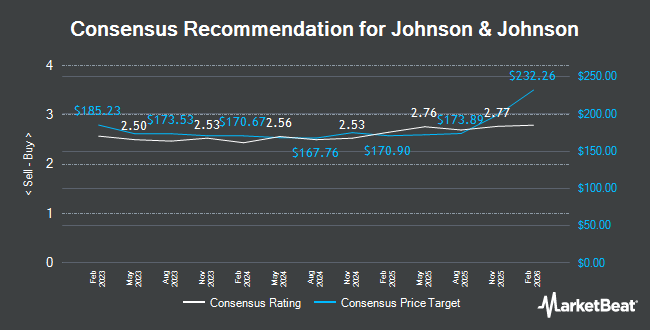Johnson & Johnson (NYSE:JNJ - Get Free Report) had its price objective reduced by Citigroup from $185.00 to $175.00 in a research note issued on Wednesday,Benzinga reports. The brokerage currently has a "buy" rating on the stock. Citigroup's price target would indicate a potential upside of 19.32% from the stock's previous close.
A number of other research analysts have also recently issued reports on JNJ. StockNews.com upgraded shares of Johnson & Johnson from a "buy" rating to a "strong-buy" rating in a research note on Saturday, September 14th. Cantor Fitzgerald restated an "overweight" rating and issued a $215.00 price objective on shares of Johnson & Johnson in a research report on Wednesday, October 16th. Wells Fargo & Company boosted their price objective on shares of Johnson & Johnson from $163.00 to $166.00 and gave the stock an "equal weight" rating in a research report on Wednesday, October 16th. Guggenheim boosted their price objective on shares of Johnson & Johnson from $156.00 to $162.00 and gave the stock a "neutral" rating in a research report on Wednesday, November 6th. Finally, Morgan Stanley lifted their target price on shares of Johnson & Johnson from $169.00 to $175.00 and gave the stock an "equal weight" rating in a report on Wednesday, October 16th. Seven analysts have rated the stock with a hold rating, seven have given a buy rating and one has issued a strong buy rating to the company. According to MarketBeat, the company presently has an average rating of "Moderate Buy" and an average price target of $174.73.
View Our Latest Report on JNJ
Johnson & Johnson Price Performance
Shares of NYSE:JNJ traded down $2.56 during trading on Wednesday, reaching $146.67. The stock had a trading volume of 3,879,262 shares, compared to its average volume of 7,081,807. Johnson & Johnson has a 52 week low of $143.13 and a 52 week high of $168.85. The business's 50-day moving average price is $157.58 and its 200 day moving average price is $156.42. The company has a debt-to-equity ratio of 0.45, a current ratio of 1.03 and a quick ratio of 0.79. The stock has a market capitalization of $353.13 billion, a PE ratio of 21.25, a P/E/G ratio of 2.66 and a beta of 0.51.
Johnson & Johnson (NYSE:JNJ - Get Free Report) last posted its earnings results on Tuesday, October 15th. The company reported $2.42 earnings per share (EPS) for the quarter, beating analysts' consensus estimates of $2.21 by $0.21. Johnson & Johnson had a net margin of 19.14% and a return on equity of 35.45%. The company had revenue of $22.47 billion during the quarter, compared to analysts' expectations of $22.17 billion. During the same quarter in the previous year, the company posted $2.66 earnings per share. Johnson & Johnson's quarterly revenue was up 5.2% compared to the same quarter last year. As a group, equities analysts predict that Johnson & Johnson will post 9.93 earnings per share for the current year.
Institutional Inflows and Outflows
A number of institutional investors and hedge funds have recently bought and sold shares of the stock. DGS Capital Management LLC lifted its stake in Johnson & Johnson by 17.5% in the 3rd quarter. DGS Capital Management LLC now owns 5,404 shares of the company's stock valued at $876,000 after purchasing an additional 804 shares during the last quarter. Copley Financial Group Inc. acquired a new stake in Johnson & Johnson in the third quarter worth $676,000. Retirement Systems of Alabama grew its holdings in Johnson & Johnson by 4.0% in the third quarter. Retirement Systems of Alabama now owns 1,243,090 shares of the company's stock worth $201,455,000 after purchasing an additional 48,250 shares during the period. Oddo BHF Asset Management Sas acquired a new stake in Johnson & Johnson in the third quarter worth $406,000. Finally, Inspire Trust Co. N.A. grew its holdings in shares of Johnson & Johnson by 12.2% during the third quarter. Inspire Trust Co. N.A. now owns 24,063 shares of the company's stock valued at $3,900,000 after buying an additional 2,610 shares during the last quarter. Institutional investors and hedge funds own 69.55% of the company's stock.
Johnson & Johnson Company Profile
(
Get Free Report)
Johnson & Johnson, together with its subsidiaries, researches, develops, manufactures, and sells various products in the healthcare field worldwide. The company's Innovative Medicine segment offers products for various therapeutic areas, such as immunology, including rheumatoid arthritis, psoriatic arthritis, inflammatory bowel disease, and psoriasis; infectious diseases comprising HIV/AIDS; neuroscience, consisting of mood disorders, neurodegenerative disorders, and schizophrenia; oncology, such as prostate cancer, hematologic malignancies, lung cancer, and bladder cancer; cardiovascular and metabolism, including thrombosis, diabetes, and macular degeneration; and pulmonary hypertension comprising pulmonary arterial hypertension through retailers, wholesalers, distributors, hospitals, and healthcare professionals for prescription use.
See Also

This instant news alert was generated by narrative science technology and financial data from MarketBeat in order to provide readers with the fastest and most accurate reporting. This story was reviewed by MarketBeat's editorial team prior to publication. Please send any questions or comments about this story to contact@marketbeat.com.
Before you consider Johnson & Johnson, you'll want to hear this.
MarketBeat keeps track of Wall Street's top-rated and best performing research analysts and the stocks they recommend to their clients on a daily basis. MarketBeat has identified the five stocks that top analysts are quietly whispering to their clients to buy now before the broader market catches on... and Johnson & Johnson wasn't on the list.
While Johnson & Johnson currently has a "Moderate Buy" rating among analysts, top-rated analysts believe these five stocks are better buys.
View The Five Stocks Here
Almost everyone loves strong dividend-paying stocks, but high yields can signal danger. Discover 20 high-yield dividend stocks paying an unsustainably large percentage of their earnings. Enter your email to get this report and avoid a high-yield dividend trap.
Get This Free Report
Like this article? Share it with a colleague.
Link copied to clipboard.